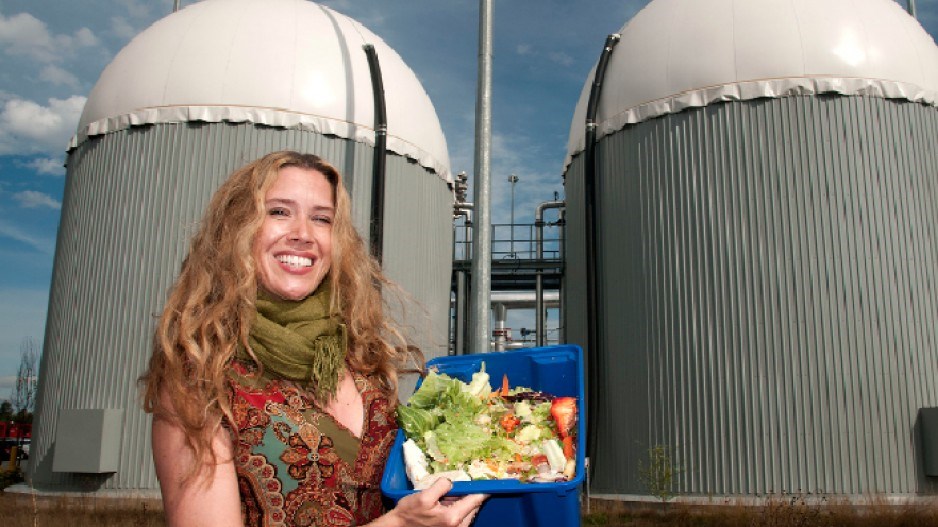A Richmond composting business is set to fire up the energy component of its 9.3-hectare facility and turn rotting food into electricity.
Harvest Power invested tens of millions of dollars to import anaerobic digesters from Germany and set up the energy recovery system, which captures the biogas byproduct of decomposing food and generates electricity and thermal heat.
“It’s using food waste for its maximum potential,” said Farrell Spence, client relations manager at Harvest Power’s Richmond location. “Food waste has a caloric content … that contains a certain amount of energy that can be [biologically trapped] and converted into natural gas and or electricity.”
Massachusetts-based Harvest Power operates large-scale composting facilities across the United States and Canada. It acquired local composter Fraser Richmond Soil and Fibre in 2009.
Harvest Power was attracted to the Lower Mainland because of the region’s progressive environmental policies,said CEO Paul Sellew.
“We saw good policy in Metro Vancouver around diversion of organics from the waste stream,” he said.
Harvest Power’s Richmond facility accepts food scraps and other organic waste from Metro Vancouver municipalities. It composts the organics and, with the addition of the anaerobic digesters, will also be able to capture biogas from the rotting food. That biogas can be burned to make energy.
Sellew said two-thirds of the facility’s revenue will come from energy sales and the other third will be generated by compost sales.
The Richmond operation will produce enough energy to power 900 homes a year and has a long-term contract to sell the power to BC Hydro.
“We recently started up the plant, and it’s working well,” Sellew said.
Harvest Power also received $5.5 million in federal and provincial funding to set up the energy system and $2 million from Metro Vancouver for site improvements over the next 10 years.
Sellew said his facility represents a cost savings for municipalities, who pay about 50% less to transport waste to Richmond rather than trucking it farther to landfills.
Harvest Power is just one Lower Mainland business retooling to take advantage of an upcoming policy change: in 2015, all Metro Vancouver homeowners and businesses will be required to separate organic waste, including food scraps. Currently, several municipalities across the region offer food scraps pickup for single-family homes.
Recycling Alternative owners Louise Schwarz and Robert Weatherbe are seeing some businesses and multi-family buildings get set up in advance of the new rules. The 35-employee Vancouver company competes with large waste haulers like BFI for recycling and food scraps collection. The company recently designed its own truck to pick up all the recycling and food scraps categories.
But compared with picking up recyclables like paper, glass and cans, it’s hard to make a buck collecting food scraps, Weatherbe said.
“You’re doing it with one of the heaviest components, which is also a live [decomposing] load, which means it has to be moved quickly to the facility … and you pay a disposal fee. So at the end of the day, it’s not a great business model to be going after organics.”
For Recycling Alternative, the payoff comes when food scraps pickup is just one component of an overall recycling contract with a business or strata.
The company is also renting on-site commercial composters to businesses so that food scraps can be reduced by about 80% before pickup. Schwarz said that option is especially popular with restaurants.
Harvest Power’s main compost competitor in the Lower Mainland is Delta’s EnviroSmart Organics. Owner Daryl Goodwin said the facility started off composting plant waste from greenhouses in 1997 and now also accepts food scraps.
EnviroSmart sells its compost and uses the compost to grow turf for its sister business, West Coast Instant Lawns.
Like Harvest Power, Goodwin has contracts with Metro Vancouver municipalities, which pay to dispose organic waste at his facility.
But he doesn’t plan on getting into the energy business.
“Financially it’s a negative,” said Goodwin, noting the amount of money supplied by government sources to finance the cost of the anaerobic digesters. “It’s a show stopper.”




